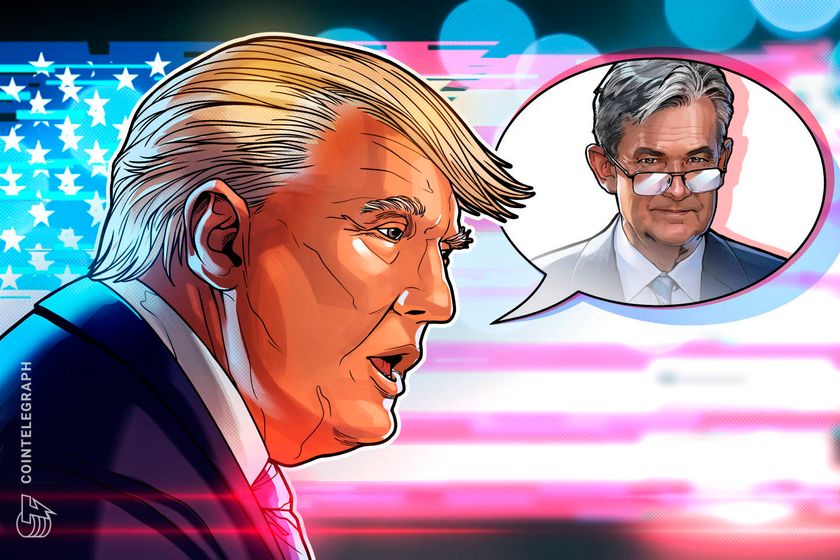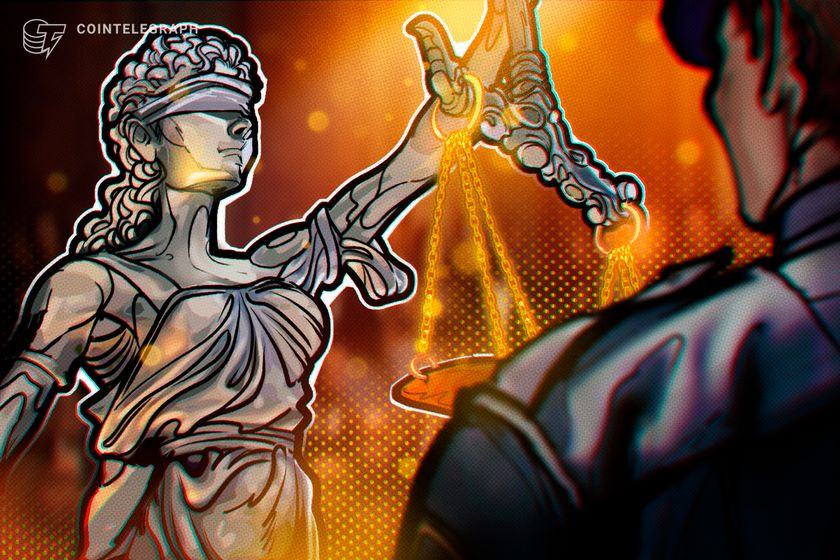

Recent months have seen the ebb and flow of a certain pattern: US President Donald Trump will take some objectively harmful action to the US economy, and the markets will crash. Seeing this, Trump has turned to Jerome Powell, chair of the Federal Reserve, and now demands he lower the Fed Funds Rate — the rate at which the Fed lends money to banks. And the steely eyed Powell will say “No.”
Trump wants to lower rates because doing so is an effective cash injection into the United States economy, stimulating activity and lifting the market. This, he believes, will make him appear successful. Powell wants to follow rigorous economic standards to set rates to carefully balance the Fed’s dual mandates of maximizing employment and maintaining stable prices.
He also wants to maintain the Fed’s independence from political pressure and, crucially, maintain the Fed’s appearance of independence from political pressure. If the markets believe that the central bank’s independence has failed in the US, it may become more difficult to sell US Treasury Bills, the United States’ sovereign debt. That is a problem in the fundamental sense that the US will have to pay more to borrow money, making it poorer — but it is an especially acute problem now because the US already has an enormous, $30-trillion pile of debt which it has to periodically refinance.
If it is forced to refinance at higher rates because markets do not trust the US government anymore, then an ever greater percentage of GDP will be absorbed by the cost of interest, and, as the kids say, the United States will be cooked.
That dance takes us to now. Last week, Trump repeatedly intimated that he would like to fire Powell, and the market didn’t like it. On Monday, Trump provoked a crash by calling Powell a “major loser” on Truth Social. In response, Treasury Secretary Scott Bessent has reportedly voiced concerns with the risks of firing Powell to Trump, who seems, for now, to have acquiesced, stating Tuesday that he would not fire his Fed chair.
Still, this process feels more like a spiral than anything else, and many market watchers are waiting for the next shoe to drop. That forces the question: if Trump does go through with his base instincts and axes Powell, what will be the result? In particular, what effect will this have on the cryptocurrency industry?
Cracking the Fed
It bears mentioning that the President is not supposed to be able to fire the Fed chair at will. Section 10 of the Federal Reserve Act of 1913 states that “each member shall hold office for a term of fourteen years from the expiration of the term of his predecessor, unless sooner removed for cause by the President.”
This language may appear ambiguous, but in the 1935 case Humphrey’s Executor v. United States, the Supreme Court ruled that the Constitution does not give the President an “illimitable power of removal” and so the President’s removal power is limited by statutory language.
This decision ratified the concept of “independent agencies,” which reside within the executive branch, but have independent authority. While a number of agencies have this characteristic, including the SEC, the CFTC, and the FTC, the Fed is the most important.
Related: US gov’t actions give clue about upcoming crypto regulation
Economists do not think much about the political control of central banks. Politicians have relatively short-term incentives, thinking in years or election cycles. This inherently pushes them to prefer short-termist policies, of which hot cash injections are the purest form. However, fiscal and monetary policy are delicate arts that often animate painful policy choices.
In a classic example, Richard Nixon pressured then-Fed chair Arthur Burns to pursue expansionary monetary policy in the lead up to the 1972 election, believing that it would help his reelection odds. Nixon won that election in a landslide, but soon followed catastrophic “stagflation” that crippled the United States economy for a decade, and indeed may still be felt in the industries which hollowed out during that period.
Contrast this with the policies of Paul Volcker, who, after this devastating period of stagflation, implemented a vicious series of rate increases between 1979 and 1987, which caused the “Volcker Shocks”, a series of painful recessions. However, the effect of this policy was to eventually strangle inflation and herald in the boom times of the 90s, facilitating Bill Clinton’s remarkable fiscal policy.
No politician could have made these choices, none will in the future, and that is the rub. Economists — and, crucially, markets — believe deeply that the Fed must remain independent or else the entire economic fabric of American society risks collapse. This is no hyperbole — nations with politically controlled central banks like Weimar Germany, Peronist Argentina and Venezuela have experienced such crippling hyperinflation that it led variously to multigenerational geopolitical backsliding, reports of citizens starving and eating rats, and the rise of Adolph Hitler. This is serious stuff.
To fire Powell, Trump will first have to defeat the Humphrey’s Executor precedent, a prospect that many legal scholars believe likely in light of the current Supreme Court composition. This is a Rubicon which, once crossed, marks a point of no return. Not just Trump, but every President who follows will have plenary legal authority to direct all executive officers — Fed Chair included — at their will. Most believe this will lead to ruin.
But disaster or no, it will be a test for cryptocurrency. The original Bitcoin White Paper aimed to disintermediate financial transactions from “financial institutions serving as trusted third parties.” If the Fed falls, and US monetary policy is unmoored from sound judgment, the thesis of cryptocurrency’s early years will be put in stark relief.
As Trump has provoked capital flight in recent weeks, investors have sought safety in various assets. Traditionally, any time there was a crisis, sophisticated parties fled risk assets into US Treasurys. The thinking was that these were riskless assets. Well, those days may be done. Ten year bond yields approached 5% during the peak of the Tariff Crisis and have not yet fully returned to previous lows. If Trump breaks the Fed, these outflows will be a drop in a bucket in a river, and that money may move into cryptocurrencies.
Historically, the price of Bitcoin has tightly tracked the Nasdaq (albeit with a multiplier). However, since the Tariff Crisis, while US securities prices have remained largely depressed, Bitcoin has miraculously begun to pump. This has led some to speculate that we are witnessing the long-prophesied “decoupling”, wherein crypto-assets will fulfill their original purpose and move independently from centralized assets.
It is impossible to say if this will or will not happen, but if Trump gives Powell the boot, we will find out for sure.
Out of the frying pan, and into the fire
Of course, world-historical collapse can’t be all good for crypto, and there will be significant pain across a variety of surfaces from this crisis as well. In the first instance, stablecoins will feel dire consequences almost immediately.
In the last decade, two USD-denominated stablecoins — USDC and USDT — have dominated the market. Their issuers, Circle and Tether, are both important systemic institutions and major buyers of US Treasurys, which collateralize the majority of their stablecoin obligations.
An immediate result of a Fed Crisis could be a Treasury default. The economist Noah Smith has speculated that Trump might try to write down the US’s sovereign debt:
“I suspect Trump will do something more like what he used to do as a businessman when his debt went bad — look for a cheap bailout, and if one doesn’t emerge, declare bankruptcy.”
Indeed, the President has hinted darkly at this prospect himself, in February suggesting that they might rely on pretense to mark the bills down:
“There could be a problem – you’ve been reading about that, with Treasuries and that could be an interesting problem…It could be that a lot of those things don’t count. In other words, that some of that stuff that we’re finding is very fraudulent, therefore maybe we have less debt than we thought.”
Related: Atkins becomes next SEC chair: What’s next for the crypto industry
A sovereign default would immediately affect Circle and Tether by marking down the value of their collateral. This, in turn, could leave the stablecoins undercollateralized, which might provoke a bank run. The markets may ultimately stabilize, but events could easily turn the other way, leading to collapse of major stablecoins.
This in turn would have numerous second-order effects, as smart contracts holding stables as collateral began liquidating positions, and contagion swept the rest of the market.
Interestingly, these mechanical consequences may be less dire than the political costs of a Fed Crisis, because treasuries are not the only asset that has systemic importance to crypto. The US dollar has been the world’s reserve currency for many, many years. There are lots of good reasons for this; it is relatively strong and stable, so it is good to settle trade with. But if the government backing it ceases to be strong and stable, this paradigm will likely shift.
And as more trade is executed in euro or yuan-denominated accounts, regulators in the EU and China will, in turn, have much more control of the flows of fiat currency through cryptocurrency. One prominent cryptocurrency attorney, who chose not to be named for fear of political reprisal, speculated exactly this:
“I think China will fill a lot of the void and EU will fill most of the rest. Neither would be good for crypto generally between CCP and EU over-regulating in different ways for different goals. This seems bad.”
This might prompt flight to uncollateralized crypto-primitive assets, but there is essentially no precedent for such assets being used at scale for real-world transactions. It is just as likely that a stablecoin crisis could simply kneecap the industry for years as it is catching its stride.
Ultimately, nobody knows whether Trump will fire Powell, or even if he can. Nobody knows what consequences might flow downstream from his decisions. But if a butterfly flapping its wings in Argentina can cause a tornado in Prague, then Donald Trump muttering incantations in the West Wing might vindicate or destabilize the blockchain forever.
Like it or not, we’re all along for the ride.
Magazine: UK’s Orwellian AI murder prediction system, will AI take your job? AI Eye



